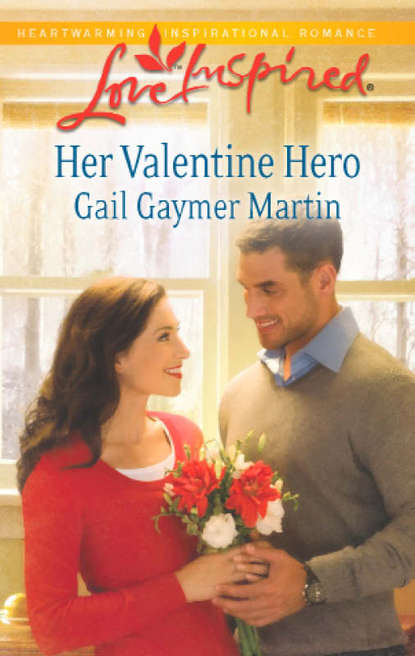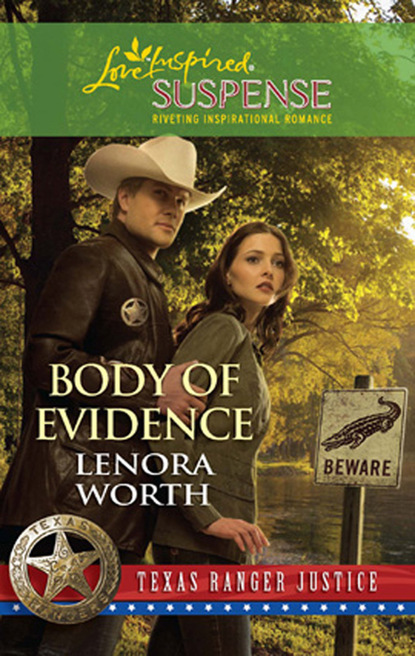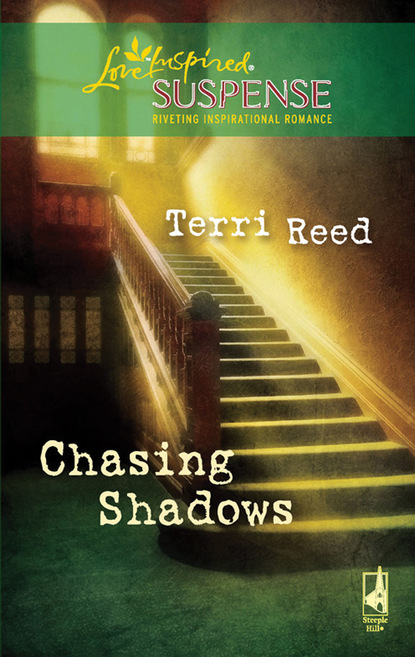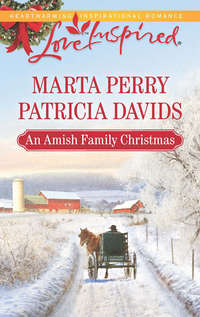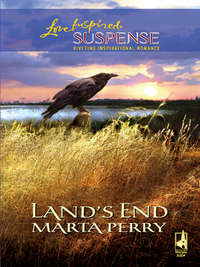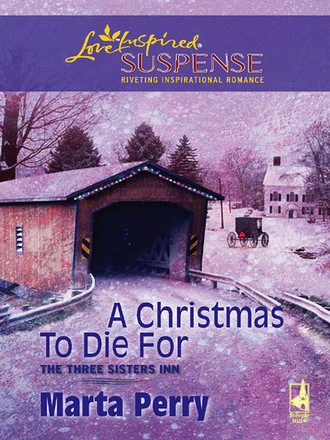
Полная версия
A Christmas to Die For
“The place looks even worse than I expected.” Tyler’s words brought her back to the present. The farmhouse, a simple frame building with a stone chimney at either end, seemed to sag as if tired of trying to stand upright. The porch that extended across the front sported broken railings and crumbling steps, and several windows had been boarded up.
“Grams told me the house had been broken into several times. Some of the neighbors came and boarded up the windows after the last incident. The barn looks in fairly good shape, though.”
That was a small consolation to hold out to him if he really hadn’t known that his mother let the place fall to bits. Still, a good solid Pennsylvania Dutch bank barn could withstand almost anything except fire.
“If those hex signs were meant to protect the place, they’re not doing a very good job.” He was looking up at the peak of the roof, where a round hex sign with the familiar star pattern hung.
“I don’t think you’d find anyone to admit they believe that. Most people just say they’re a tradition. There are as many theories as there are scholars who study them.”
Tyler went cautiously up the porch steps and then turned toward her. “You’ll have to climb over the broken tread.”
She grasped the hand he held out, and he almost lifted her to the porch. She whistled to the dog, nosing around the base of the porch. “Come, Barney. The last thing we need is for you to unearth a hibernating skunk.”
“That would be messy.” Tyler turned a key in the lock, and the door creaked open. He hesitated for an instant and then stepped inside. She followed, switching on the flashlight that Grams had reminded her to bring.
“Dusty.” A little light filtered through the boards on the windows, and the beam of her flashlight danced around the room, showing a few remaining pieces of furniture, a massive stone fireplace on the end wall, and a thick layer of dust on everything.
Tyler stood in the middle of the room, very still. His face seemed stiff, almost frozen.
“I’m sorry if it’s a disappointment. It was a good, sturdy farmhouse once, and it could be again, with some money and effort.”
“I doubt I’d find anyone interested in doing that.” He walked through the dining room toward the kitchen, and she followed him, trying to think of something encouraging to say. This had to be a sad homecoming for him.
“There’s an old stone sink. You don’t often see those in their original state anymore.”
He sent her the ghost of a smile. “You want to try out the pump?”
“No, thanks. That looks beyond repair. But I can imagine some antique dealer drooling over the stone sink. Those are quite popular now.”
“I suppose I should get a dealer out to see if there’s anything worth selling. I remember the house as being crowded with furniture, but there’s not too much left now.”
“My grandmother could steer you to some reputable dealers. Didn’t your mother take anything back with her after your grandfather died?”
She couldn’t help being curious. Anyone would be. Why had the woman let the place fall apart after her father died? Grief, maybe, but it still seemed odd. Surely she knew how valuable a good farm was in Lancaster County.
“Not that I remember.” He turned from a contemplation of the cobwebby ice box to focus on her. “You spoke of break-ins. Was anything stolen?”
“I don’t know. My grandmother might remember. Or Emma Zook, since they’re such close neighbors. She’s our housekeeper.”
“The Amish woman who was in the kitchen this morning? According to the lawyer who handled my grandfather’s will, the Zooks leased some of the farmland from his estate. I need to get that straightened out before I put the place on the market. I should talk to them. And to your grandmother.”
Something about his intent look made her uneasy. “I doubt that she knows anything about their leases.”
“According to my mother, Fredrick Unger offered to buy the property. That would make me think your family had an interest.”
There was something—an edgy, almost antagonistic tone to his voice, that set her back up instantly. What was he driving at?
“I’m sure my grandfather’s only interest would have been to keep a valuable farm from falling to pieces. Since he died nearly five years ago, I don’t imagine you’ll ever know.”
“Your grandmother—”
“My grandmother was never involved in his business interests.” And she wasn’t going to allow him to badger her with questions. “I can’t see that it matters, since your mother obviously didn’t want to sell. Maybe what you need to do is talk to the attorney.”
Her own tone was as sharp as his had been. She wasn’t sure where the sudden tension had come from, but it was there between them. She could feel it, fierce and insistent.
Tyler’s frown darkened, but before he could speak, there was a noisy creak from the living room.
“Hello? Anybody here?”
“Be right there,” she called. She’d never been quite so pleased to hear Phillip Longstreet’s voice. She didn’t know where Tyler had been going with his questions and his attitude, and she didn’t think she wanted to.
TWO
Tyler didn’t miss the relief on Rachel’s face at the interruption. The speed with which she went into the living room was another giveaway. She might not know what drove him, but she’d picked up on something.
Or else he’d been careless, pushing too hard in his drive to get this situation resolved.
He followed her and found her greeting the newcomer with some surprise. “Phillip. What are you doing here?”
The man raised his eyebrows as she evaded his attempt to hug her. “Aren’t you going to introduce me?” He held out his hand to Tyler. “Phillip Longstreet. You may have noticed Longstreet Antiques on Main Street in the village.”
He was in his late forties or early fifties at a guess, but he wore his age well—fit-looking, with fair hair that showed signs of gray at the temples and shrewd hazel eyes behind the latest style in glasses.
“This is Tyler Dunn.” She glanced at him, and he thought he read a warning in her eyes.
“Nice to meet you. Were you looking for Ms. Hampton?”
“It’s always pleasant to see Rachel, but no, I wanted to meet the new owner.” Longstreet shrugged, smiling. “I like to get in before the other dealers when I can.”
“How did you know?” Rachel sounded exasperated. “If we had a party line, Phillip, I’d suspect you of eavesdropping.”
“I have to be far more creative than that to stay ahead of the competition. If you want to keep secrets, don’t come to a village. Emma’s son, Levi, delivered the news along with my eggs this morning.”
It was an insight into how this place worked. “Are you interested in the contents of the house, Mr. Longstreet?”
A local dealer might be the best choice before putting the house on the market, but Longstreet was obviously trolling for antiques, probably hoping to get an offer in on anything of value before his competition did. Or possibly before Tyler realized what he had.
“Phil, please. I’d like to look around.” Longstreet’s gaze was already scoping out the few pieces left in the living room. “Sometimes there are attractive pieces in these old farmhouses, although more often it’s a waste of time.”
“I’m afraid your time was definitely wasted this afternoon.” He gestured toward the door. “I’m not ready to make a decision about selling anything yet.”
“If I could just take a look around, I might be able to give you an idea of values.” Longstreet craned his neck toward the dining room.
Tyler swung the door open and stepped out onto the porch, so that the man had no choice but to follow. “I’ll be in touch when I’m ready to make a decision. Thank you for stopping by.”
“Yes, well, thanks for your time.” Longstreet stepped gingerly over the broken step. “Rachel, I’ll see you at the meeting tonight.”
Rachel, coming out behind him, bent to snap a leash onto the dog’s collar. “Fine.”
Tyler waited until Longstreet had backed out of the driveway to turn to her. “Is that one of the reputable dealers your grandmother might recommend?”
“Grams probably would suggest him. His uncle was an old crony of my grandfather.”
“But…?”
Her nose crinkled. “Phil’s nice enough, in his way. It’s just that every time he comes to the inn, I get the feeling he’s putting a price on the furniture.”
“I’m not bad at showing people the door, if you’d like some help.”
“I run an inn, remember?” She smiled, her earlier antagonism apparently gone. “The idea is to get people in, not send them away. Are you a bouncer in your real life?”
“Architect. Showing people the way out is just a sideline.”
She looked interested. “Do you work on your own?”
He shook his head. “I’m with a partner in Baltimore, primarily designing churches and public buildings. Luckily I’m between projects right now, so I can take some time off to deal with this.” Which brought him back to the problem at hand. “Well, if your grandmother recommends Longstreet, I’ll still be sure to get offers from more than one dealer.”
“That should keep him in line. He’s probably easier to cope with when he wants to buy something from you. I’m on the Christmas in Churchville committee with him, and he can be a real pain there.”
He pulled the door shut and turned the key in the lock.
“Are you sure you’re finished? You didn’t look around upstairs.”
“I’ve had enough for the moment.” He tried to dismiss the negative feelings that had come with seeing the place again. This was a fool’s errand. There was no truth left to find here—just a moldering ruin that had never, as far as he could tell, been a happy home.
The dog leaped down from the porch, nearly pulling Rachel off balance, and he caught her arm to steady her.
“Easy. Does he really need to be on the leash?”
“I wanted to discourage any more digging around the porch. I’m afraid you may have something holed up in there for the winter.”
“Whatever it is, let it stay.” He took the leash from her hand and helped her over the broken step to the ground. “I won’t bother it.”
She glanced at him as they walked away. “You must be saddened to see the place in such a state.”
He shrugged. “I only saw it twice that I recall. It would have been worse for my mother than for me. She grew up here.”
“Do you think—” She stopped, as if censoring what she’d been about to say.
“That’s why she let it fall to pieces?” He finished the thought for her. “I have no idea. I’d have expected my dad to intercede, but—” he shrugged “—I didn’t know she still owned the place until a few weeks ago, and by then she was in no shape to explain much. Maybe she just wanted to forget, after the way her father died.”
Rachel scuffed through frost-tipped dead leaves that the wind had scattered over the road. “I don’t think I’ve ever actually heard how it happened.”
“From what my mother told me, he apparently confronted someone breaking into the house. There was a struggle, and he had a heart attack. He wasn’t found until the next day.”
She shivered, shoving her hands into her pockets. “It’s hard to think about something like that happening here when I was a child. It always seemed such an idyllic place.”
They walked for a few moments in silence, their footsteps muted on the macadam road. He glanced at her, confirming what he heard. “You’re limping. Did you twist your ankle getting off that porch?”
“It wasn’t that.” She nodded toward the bend in the road ahead of them, the wind ruffling her hair across her face so that she pushed it back with an impatient movement. “I had an accident just up the road back in the spring.”
He frowned down at her. “It must have been a bad one. Did you hit a tree?”
She shook her head. “I was jogging, too late in the evening, I guess. A car came around the bend—” She stopped, probably reliving it too acutely.
That explained why she’d stepped back into the trees when he’d come down the lane last night. “How badly were you hurt?”
“Two broken legs.” She shrugged. “Could have been worse, I guess. It only bothers me when I’m on my feet too long.”
“I hope the driver ended up in jail.”
“Hit and run,” she said briefly.
Obviously she didn’t want to talk about it any further. He couldn’t blame her. She didn’t want to remember, any more than he wanted to think about the way his grandfather died, or the burden his mother had laid on him to find out why.
“I guess this place isn’t so idyllic after all.”
“Bad things happen anywhere, people being people.”
“Yes, I guess they do.” Of course she was right about that. It was only the beauty that surrounded them that made violence seem so out of place here.
Rachel was thankful when the business part of the “Christmas in Churchville” meeting was over. The strain of mediating all those clashing egos had begun to tell on her after the first hour.
Now the battling committee members wandered around the public rooms of the inn, helping themselves to punch and the variety of goodies placed on tables in both the back parlor and the breakfast room. She’d figured out a long time ago that if you wanted to keep people circulating, you should space out the food and drink.
She and Grams had put cranberry punch on the round table next to the fireplace in the back parlor, accompanied by an assortment of cheeses, grapes and crackers. The breakfast room had coffee, tea and hot chocolate on the sideboard, along with mini éclairs and pfeffernüsse, the tiny clove and cardamom delicacies that were her grandmother’s special holiday recipe.
Would Tyler come down? Thinking of him alone in his room, she’d suggested he join them for refreshments. He’d know when the business meeting was over, she’d told him, when the shouting stopped.
Her committee members weren’t quite that bad, but they did have strong opinions on what would draw the holiday tourists to spend their money in Churchville.
She checked on the service in the parlor and walked back toward the breakfast room. Tyler was in an odd position here—part of the community by heritage and yet a stranger. He probably wouldn’t be around long enough to change that. He’d sell the property and go back to his life in Baltimore.
Hopefully he wouldn’t leave problems behind in the form of whoever bought his grandfather’s farm. The neighbors disliked seeing it derelict, but there were certainly things they’d hate even more.
“Rachel, there you are.” Phillip intercepted her in the doorway, punch cup in hand. Fortunately the cup made it easier to escape the arm he tried to put around her. “I wanted to speak with you about the Hostetler place.”
“So does everyone else, but I don’t know anything. Tyler hasn’t told me what his plans are for the property.”
“You know I’m all about the furniture, my dear. I remember a dough box that my uncle tried to buy once from old Hostetler. If there’s anything like that left—”
“You saw the living room. Most of the furniture is already gone.”
“I didn’t see the rest of the house.” His voice turned wheedling. “Come on, Rachel, at least give me a hint what’s there.”
“Sorry, I didn’t see anything else.” She slipped past him. “Excuse me, but I have to refill the coffeepot.”
Phillip was nothing if not persistent. That probably explained how he managed to make such a success of the shop. His uncle had been a sweet old man, but he’d never had much of a head for business, from what Grams said.
She snagged a mug of hot chocolate and a pfeffernüsse for herself, turning from the table to find Sandra Whitmoyer bearing down on her. As wife of Churchville’s most dedicated, as well as only, physician, Sandra seemed to feel the chairmanship of the decorating subcommittee was hers by right. Luckily no one else had put up a fight for it.
“Rachel, we really must keep our eyes on the rest of the shop owners along Main Street. It would be fatal to allow anyone to put up a garish display.”
“I’m sure you’ll do a wonderful job of that, Sandra.” She had no desire to turn herself into the decorating police. “I have my hands full already, preparing the inn and organizing the open house tour.” Maybe a little flattery was in order. “You have such wonderful taste. I know everyone will be seeking your advice. And they’ve all agreed to go along with the committee’s decisions.”
“Well, I suppose.” Sandra ran a manicured hand over sleek waves of blond hair. She was dressed to perfection tonight as always, this time in a pair of gray wool slacks that made her legs look a mile long, paired with a silk shirt that had probably cost the earth.
Glancing past Sandra, she spotted Tyler standing in the doorway. So he had come down. He looked perfectly composed in the crowd of strangers—self-possessed, as if he carried his confidence with him no matter where he was.
She’d seen him ruffled at moments that afternoon, though, and she’d guess he didn’t often show that side to people. The derelict house had affected him more than she’d expected.
And there had been an undercurrent when he talked about his mother, something more than grief, she thought.
Sandra had moved to the window, peering out at the patio and garden. “I suppose you’ll be decorating the garden for the open house.”
“White lights on the trees, and possibly colored ones on the big spruce.”
“It would be more effective without the security lights,” Sandra said. “You could turn them off during the house tour hours. And maybe put a spotlight on the gazebo.”
“I don’t want to draw attention to the gazebo. I’d be happy to demolish it completely.”
“You wouldn’t have to do something that drastic.”
She turned at the sound of Tyler’s voice, smiling her welcome. “What would you suggest, other than a stick of dynamite? Sandra Whitmoyer, I’d like to introduce Tyler Dunn. He owns the Hostetler place, down the road from us.”
Sandra extended her hand. “Welcome to Churchville. Everyone is curious about what you intend for the property. Well, not my husband, of course. As a busy physician, he doesn’t have time for many outside interests.”
Bradley Whitmoyer was as self-effacing a man as she’d ever met, but his wife had appointed herself his one-woman press agency.
Tyler responded, politely noncommittal, and turned back to Rachel. “I wouldn’t recommend high explosives for the gazebo. You wouldn’t like the results.”
“I don’t like it the way it is.”
He smiled down at her. “That’s because it’s in the wrong place. If you moved it to the other side of the pond, it would be far enough away to create a view.”
“Well, I still think you should decorate it for the house tour.” Sandra put down her cup. “I have to go. There’s Jeff looking for me. It was nice meeting you, Mr. Dunn.” She nodded to Rachel and crossed the room toward the hallway.
“Is that her husband, the physician?” Tyler’s tone was faintly mocking.
“No, his brother. Jeff Whitmoyer. He has a small construction company. It looks as if he didn’t find it necessary to change before coming by for Sandra.”
Jeff’s blue jeans, flannel shirt and work boots were a sharp contrast to Sandra’s elegance. There was a quick exchange between them before Sandra swept out the hallway.
Rachel dismissed them from her mind and turned back to Tyler. “About the gazebo—”
“Single-minded, aren’t you?” His smile took any edge off the comment. “It might be possible to move it, rather than destroy it. If you like, I’ll take a look while I’m here.”
“I’d love to find a solution that makes everyone happy. Grams never liked the gazebo at all—she feels it doesn’t go with the style of the house. But Andrea thinks it should stay because Grandfather had it put up as a surprise for Grams.”
“And it’s your job to keep everyone happy?” The corners of his mouth quirked.
“Not my job, exactly.” Every family had a peacemaker, didn’t they? She was the middle one, so it fell to her. “My sister says I let my nurturing instincts run amok, always trying to help people whether they want it or not.”
“It’s a nice quality.” Those deep-blue eyes seemed to warm when they rested on her. “I wouldn’t change if I were you.”
“Thank you.” Ridiculous, to be suddenly breathless because a man was looking at her with approval. “And thank you for the offer.”
He shrugged. “It’s nothing. We’re neighbors, remember?”
It was what she’d said to him, but he seemed to invest the words with a warmth that startled her.
Careful, she warned herself. It wouldn’t be a good idea to start getting too interested in a man who’d disappear as soon as his business here was wound up.
Rachel did not like climbing ladders. Any ladder, let alone this mammoth thing that allowed her to reach the top of the house. Unfortunately, there didn’t seem to be another way of putting up the outside lights anytime soon.
Grams had suggested hiring someone to do the decorating, but Grams didn’t have a grasp on how tight money was right now. Rachel could ask a neighbor for help, of course, but this was a business. It didn’t seem right if she couldn’t pay.
But she really didn’t like being up on a ladder.
She leaned out, bracing herself with one hand on the shutter, and slipped the strand of lights over the final hook. Breathing a sigh of relief, she went down the ladder. In comparison to that, doing the windows should be a breeze.
Reaching the ground, she took a step back, reminding herself of just how many windows there were. Well, maybe not a breeze, but she could do it.
And what difference would it make, the voice of doubt asked. You have one whole guest at the moment.
Tyler had gone off to Lancaster this morning to see the attorney who’d handled his grandfather’s estate. He’d seemed eager to resolve the situation with the farm. Well, why not? He probably had plans for Christmas in Baltimore.
Once he left, she’d have zero guests. There were a few people scheduled for the coming weekends, but not nearly enough. They’d hoped for a good holiday season to get them through the rest of the winter, but that wasn’t happening.
If she could get some holiday publicity up on the inn’s Web site, it might make all the difference. Andrea had intended to do that, but the rush to get ready for the wedding had swamped those plans. And she could hardly call her big sister on her honeymoon to ask for help. They had already invested all they could afford in print ads in the tourist guides, and the Web site was the only option left.
She fastened a spray of pine in place, taking satisfaction in the way the dark green contrasted with the pale stone walls. This she could do. Decorate, cook gourmet breakfasts, work twenty-four/seven when it was necessary—those were her gifts.
Her gaze rested absently on the church across the street, its stone walls as gold as the inn. Someone had put evergreen wreaths on the double doors, and the church glowed with welcome. That was what she’d sensed when she’d come back to Churchville. Welcome. Home. Family. Community. She’d lost that when Daddy left and their mother had taken them away from here.
She paused with her hand on the burgundy ribbon she was tying. Lord, this venture can’t be wrong, can it? It seems right. Surely You wouldn’t let me have a need so strong if it weren’t meant to be satisfied.
“Rachel, you look as if you’ve turned to stone up there. Are you all right?”
She glanced down from the window to see Bradley Whitmoyer standing on the walk, eyeing her quizzically. She scrambled down from the stepladder.
“I guess that’s what they mean by being lost in thought, Dr. Whitmoyer. What can I do for you?”
She saw him occasionally, of course, when she took Grams for a check-up, at church, at a social event, but he’d never come to the inn.
“Bradley,” he corrected. “I’m on an errand.” He gave her his gentle smile, pulling an envelope from the pocket of his overcoat. “My wife asked me to drop this off on my way to the office. Something to do with this Christmas celebration you’re working on, I think.”


